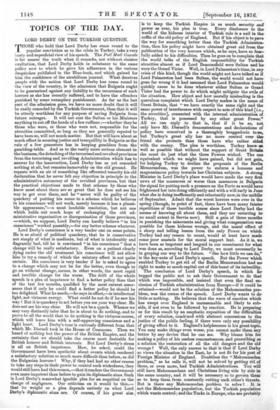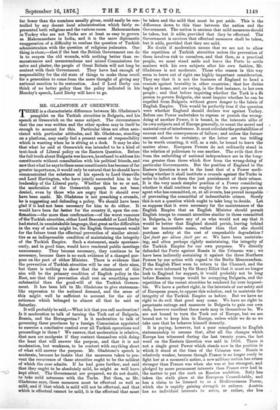TOPICS OF THE DAY.
LORD DERBY ON THE TURKISH QUESTION.
THOSE who hold that Lord Derby has come round to the popular conviction as to the crisis in Turkey, take a very hasty and superficial view of his speech. The Pall Mall Gazette is far nearer the truth when it remarks, not without sinister exultation, that Lord Derby holds in substance to the same policy now to which he gave his adherence in the various despatches published in the Blue-book, and which gained for him the confidence of the atrabilious journal. What deceives people with the notion that Lord Derby has come round to the view of the country, is the admission that Bulgaria ought to be guaranteed against any liability to the recurrence of such horrors as she has recently suffered, and to have the offenders punished by some exemplary punishment. As far as the last part of the admission goes, we have no more doubt that it will be easily conceded by the Turkish Government, than that it will be utterly worthless for any purpose of saving Bulgaria from future outrages. It will not cost the Sultan or his Ministers anything to cut off the heads of a few ruffians ;—whether they be those who were, or those who were not, responsible for the atrocities committed, so long as they are generally reputed to have been so, will not much matter. But that will have about as much effect in securing justice and tranquillity in Bulgaria as the ruin of a few gamesters has in keeping gamblers from the gambling-table. And as to the vastly more serious element in the business, the detaching of the terrorised and revolted provinces from the terrorising and revolting Administration which has to answer for the insurrection, Lord Derby has as yet conceded nothing at all, but remains immovably on the old ground. He repeats with an air of something like affronted tenacity his old declaration that he never felt any objection in principle to the administrative autonomy of the revolted provinces, but that the practical objections made to that scheme by those who know most about them are so great that he does not see his way to get over them, and he "never will be guilty of the quackery of putting his name to a scheme which he believes in his conscience will not work, merely because it has a plausi- ble appearance,"—a most laudable resolution, but not one which holds out much hope of exchanging the old ad- ministrative organisation or disorganisation of those provinces, —which, we suppose, Lord Derby can hardly believe "in his conscience" worked passably,—for any better scheme whatever.
Lord Derby's conscience is a very tender one on some points. He is so afraid of political quackery, that he is conservative not simply of what is mediocre, but of what is intolerably and flagrantly bad, till he is convinced "in his conscience" that a change will be really satisfactory. Even on a patient clearly dying under the old treatment his conscience will not allow him to try a remedy of which the salutary effect is not quite certain. His conscience is very tender if he is asked to agree to a change which may not be for the better, even though to go on without change, means, in other words, the most rapid and terrible change for the worse. The drift of the whole speech is a plea of impotence to find a better policy than that of the last few months, qualified by the most earnest assur- ances that if only he could find a better policy he should be too delighted. What he needs,---he says in effect,—is intellectual light, not virtuous energy. What could he not do if he saw his way ? But it is quackery to act before you see your way clear. He does not see his way clear. He will not be a quack. Whence we may very distinctly infer that he is about to cto nothing, and to prove to all the world that to do nothing is the virtuous course, which will leave him with a self-approving conscience and a light heart. Lord Derby's tone is curiously different from that whkh Mr. Disraeli took in the House of Commons. Then we heard of nothing but the power of the British Empire, and the certainty that we should take the course most desirable for British honour and British interests. But Lord Derby's stress is all on British impotence. How, he asked, could the Government have been apathetic about events which rendered a satisfactory solution so much more difficult than before, as did the Bulgarian horrors? Why, if they had had no other reason to take any steps in their power to control such wickedness, they would still have had this reason,—that it renders the Government even more impotent than before to gain its diplomatic aims. Such is Lord Derby's somewhat ignoble plea for an acquittal on the charge of negligence. Our criticism on it would be this,— that its weight as a plea depends entirely on what Lord Derby's diplomatic aims are. Of course, if his great aim is to keep the Turkish Empire in as much security and power as ever, his plea is true. Every disclosure to the world of the hideous interior of Turkish rule is a nail in the. coffin of the old policy of England. But if his object is to pave the way for something better than the Turkish Administra- tion, then his policy might have obtained great aid from the publication of the very horrors which, as he says, have so fear- fully added to his difficulties. Then he goes on to complain that the world talks of the English responsibility for Turkish atrocities almost as if Lord Beaconsfield were Sultan and- he' were the Grand Vizier. Well, in Lord Palmerston's time, in any crisis of this kind, though the world might not have talked as if Lord Palmerston had been Sultan, the world would not have gone far wrong if it had assumed that Lord Palmerston would. quickly cause to be done whatever either Sultan or Grand Vizier had the power to do which might mitigate the evils of the situation. How abject and how morally misleading is the querulous complaint which Lord Derby makes in the name of Great Britain, that "we have exactly the same right and the same power of interference with respect to acts of this kind [i.e., the atrocities], connected with the internal administration of Turkey, that is possessed by any other great Power." All we can reply to that is, that if it be so, not only have Mr. Disraeli's demonstrations and declarations of policy been conceived in a thoroughly braggadocio tone, but Turkey's great ally has no more control over the friend she protects than those have who rather sided with the enemy. The plea is worthless. Turkey knew.aa well as possible that without the support of Great Britain. she must do just what the three Powers wished. The one equivalent -which we might have gained, but did not gain,. for helping Turkey to decline the proposals of the Berlin Memorandum, was the power to enforce a humane and magnanimous policy towards her Christian subjects. A strong. Minister in Lord Derby's place would have made the very first news of the massacres or worse than massacres in Bulgaria the signal for putting such a pressure on the Porte as would have frightened her into doing efficiently and with a will early in June what she is doing inefficiently and reluctantly now,in the middle of September. Admit that the worst horrors were over in the spring (though, in point of fact, there have been many fainter repetitions of these terrible scenes since Lord Derby had the means of knowing all about them, and they are occurring to' no small extent in Servia now). Still a gain of three months- in punishing the miscreants and giving what compensation was- possible for these hideous wrongs, and the moral effect of a sharp and telling lesson from the only Power on which Turkey had any reason to count, would at least have made some poor amends for the moral support lent. As it is, we. have been as impotent and languid in our resentment for what was done as, according to Lord Derby, we must necessarily be in groping our way to the future. "See how little we can do,' is the key-note of Lord Derby's speech. But the Power which enabled Turkey to get rid of the Berlin Memorandum had no right to make so much capital out of this boast of its imbecility.
The conclusion of Lord Derby's speech, in which he begged the public not to ask their Government to do that which was impossible, and insisted that even the final ex- clusion of Turkish administration from Europe—if it could be attained—would not be the solution of the Mahommedan pro- blem, was the cream of the speech. Lord Derby wants to de little or nothing. He believes that the wave of emotion which has swept over England is unreasonable and likely to sub- side, if not even to be followed by reaction. He is preparing us for this result by an emphatic exposition of the difficulties of every solution, combined with abstract concessions to the justice of the public feeling, if there were only any possibility of giving effect to it. England's helplessness is his great topic. You may make things even worse, you cannot make them any better by any device that he can see. Why blame him for making a policy of his useless remonstrances, and prescribing as a solution the restoration of all the old dangers and the old wrongs? Well, the only answer to that is that if Lord Derby so views the situation in the East, he is not fit for his post of Foreign Minister of England. Doubtless the 64 Mahommedan problem," as he calls it, will not be solved by getting rid of three, or even more, bad Turkish Administrations. You will still have M.ahommedans and Christians living side by side in the same country, and it will be necessary so to govern them as to keep them from constantly cutting each other's throats. But is there any Mahommedan problem to solve ? It is not the Mahommedan population, but the Turkish population which wants control; and the Turks in Europe, who are probably far fewer than the numbers usually given, could easily be con- trolled by any decent local administration which fairly re- presented both religions and the various races. Mahommedans in Turkey who are not Turks are at least as easy to govern as Mahommedans in India, and it is the mere diplomatic exaggeration of a difficulty to confuse the question of Turkish administration with the question of religious jealousies. One thing is clear,—that if the best the British Government can do is to reopen the old wounds, with nothing better than re- monstrances and memorandums and mixed Commissions for salve and plaster, the people of Great Britain will not long be content with their Government. They have had enough of responsibility for the old state of things to make them recoil for a generation to come from the mere thought of giving any national sanction to its restoration. And if Lord Derby can think of no better policy than the policy indicated in his Monday's speech, Lord Derby will have to go.































 Previous page
Previous page